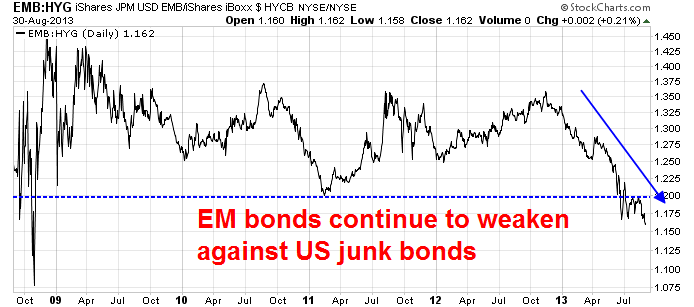Bonds & Interest Rates
 What I am concerned about is the re-emergence of tail-risk in the emerging markets. The Fed’s QE tapering has signaled that risk premiums are likely to rise (see my previous post Regime shift = Volatility). The Fed’s QE program was intended to push down Treasury, and later, MBS yields and to compress risk premiums in order to encourage market participants to take more risk and kick start economic growth. As the Fed signals that it is starting the process of unwinding this program, risk premiums are likely to rise.
What I am concerned about is the re-emergence of tail-risk in the emerging markets. The Fed’s QE tapering has signaled that risk premiums are likely to rise (see my previous post Regime shift = Volatility). The Fed’s QE program was intended to push down Treasury, and later, MBS yields and to compress risk premiums in order to encourage market participants to take more risk and kick start economic growth. As the Fed signals that it is starting the process of unwinding this program, risk premiums are likely to rise.

The news of the day from the Bank of Canada is that they will be holding the Bank Rate at 1%. The Bank also stressed the need to keep rates low for a while (the consensus of economists is that this will be the case until the 4th quarter of 2014) citing sluggishness in the Canadian economy and subdued inflation (core inflation that is, not the inflation that we experience in our everyday lives).
However, since Stephen Poloz ascended to Governor of the Bank of Canada in early June, longer-term market rates have actually increased despite his initial dovishness. In fact, on the 10-year Government of Canada Bonds the yield has risen from 2.05% to 2.70%. These longer-term bond yields affect the rates on most types of financing, including mortgages.
During the 30-Year Secular Bull Market in bonds, which ended in July 2012, central bank policy and the direction of longer-term bond rates in the market tended to move in unison. Bond investors placed a little more trust in the policymakers and were happy to take their cue and traded in the direction that central banks suggested they should. However, over the last year, things have changed. This has been especially the case with the U.S. Federal Reserve and the Bank of Canada.
So, although Poloz and the Bank of Canada have a desired target with respect to interest rates, we are witnessing that fact that the bond market needs to cooperate to make this happen. Without that, the dovishness in terms of Bank of Canada policy merely becomes rhetoric, the type of which good investors begin to tune out.
The opinions expressed in this report are the opinions of the author and readers should not assume they reflect the opinions or recommendations of Richardson GMP Limited or its affiliates. Assumptions, opinions and estimates constitute the author’s judgment as of the date of this material and are subject to change without notice. We do not warrant the completeness or accuracy of this material, and it should not be relied upon as such. Before acting on any recommendation, you should consider whether it is suitable for your particular circumstances and, if necessary, seek professional advice. Past performance is not indicative of future results.
Richardson GMP Limited, Member Canadian Investor Protection Fund.
Richardson is a trade-mark of James Richardson & Sons, Limited. GMP is a registered trade-mark of GMP Securities L.P. Both used under license by Richardson GMP Limited.


In Iran, the June elections ushered in a political change in the wind. President Hassan Rouhani won the election in Iran with a landslide. He campaigned on trying to get rid of the economic sanctions by engaging with the West. His victory was so impressive among the youth that he won even the very cautious backing of….


The report says Canada’s housing market is the second-most expensive among 19 nations surveyed when measured by price-to-rent, and among the top three when it comes to price-to-income.
“If these ratios are higher than their historical averages … property is overvalued; if they are lower it is undervalued. On this basis, Canada’s house prices are bubbly whereas Japan’s are undeservedly flat,” the magazine said in its latest issue.

The Bank of Canada held its benchmark interest rate steady at 1 percent on Wednesday, as forecast, and said exports and business investment were taking longer than expected to replace household spending as the key driver of economic growth.












